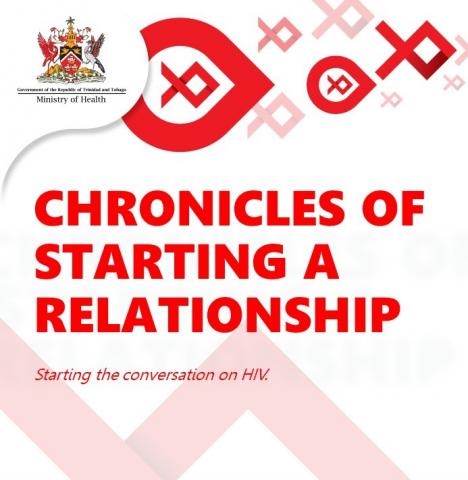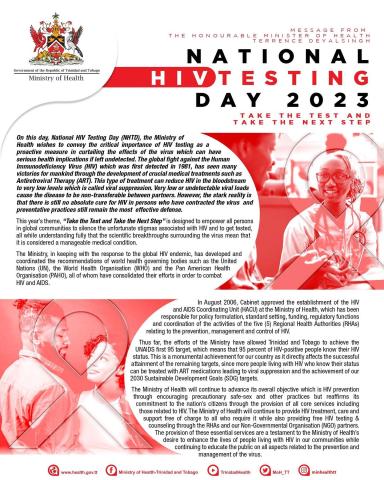Mandate
The mandate of the HIV/AIDS Coordinating Unit is to lead the Ministry of Health’s response in reducing the incidence of HIV infections in Trinidad & Tobago and also mitigating the impact of HIV/AIDS in persons infected and affected in Trinidad & Tobago.
Background
The Ministry of Health’s National AIDS Programme was renamed the HIV and AIDS Coordinating Unit (HACU) through a Cabinet minute No. 166 of August 2006. HACU is responsible for policy formulation, standard setting, funding, regulatory functions and coordination of the activities of the five Regional Health Authorities (RHAs). Regarding policy formulation, some of the key policies include the National HIV Testing and Counselling Policy, Health Sector Workplace HIV and AIDS Policy, the Prevention of Mother to Child Transmission Policy and the Post Exposure Prophylaxis Policy. This unit coordinates, advises on policy direction, monitors and evaluates the implementation of the Ministry of Health’s response to the HIV epidemic through the following priority areas :
- Prevention Combining Behavioural, Biomedical and Structural Interventions
- Optimizing Diagnosis, Treatment, Care and Support Outcomes
- Advocacy, Human Rights and an Enabling Environment
- Strategic Information
Key Roles and Responsibilities
The unit provides regulatory oversight through monitoring and evaluation as well as continual review of policy and programming initiatives to optimize service delivery programmes. The prevention programmes include:
- Free HIV Testing & Counselling: This serviceis offered through the RHAs and non-governmental organizations (NGO) partners. In the Same Day HIV Counselling and Testing Programme, patient risk assessments are done to ensure that persons remain HIV negative and HIV positive persons get the requisite treatment, care and psychosocial support to both optimize their health and not be a transmission risk to others.
- Prevention of Mother to Child Transmission Programme (PMTCT): The current strategy is to eventually eliminate the transmission of HIV from mother to child through the Prevention of Mother to Child Transmission (PMTCT) Programme. All first attendees to antenatal clinics are offered an HIV test twice in pregnancy. Expectant mothers found HIV positive are referred for treatment and with current therapy can effectively prevent transmission to the unborn.
- Health Promotion using Information, Education and Communication: As a final arm of the main prevention strategy, it is based on health promotion and event campaigns. These include collaborations with Rapport, a youth intervention service offering information, education and counselling to the nation’s youth, as well as, national testing campaigns including World AIDS Day and Caribbean HIV Testing Day.
- HIV Treatment, Care and Support: This programme provides free antiretroviral treatment and care programmes for both adults and children infected and affected by HIV through the RHAs (Regional Health Authorities) with access to laboratory HIV diagnostic services.
Target Groups:
- General population (in home, school and work settings)
- General population accessing health services
- Vulnerable populations (e.g. youth & young adults, migrants, substance abusers, victims of sexual violence, women, children, elderly )
- Most at risk populations
- Health providers (as a workplace issue and for continuing professional development to deliver services)
Publications


Contact Information
Ministry of Health
4 - 6 Queen's Park East
Port of Spain
Telephone: (868)-217-4664 Ext. 11502 - 11529